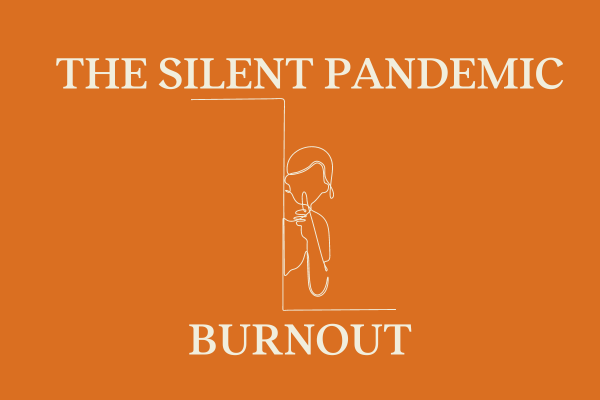Silent Epidemic: In today’s hyper-connected, always-on world, burnout has become the silent epidemic that nobody wants to admit they’re struggling with. Yet, millions of people worldwide are feeling overwhelmed, exhausted, and stuck in a cycle of never-ending stress. The good news? You can break free. Here’s how to recognize burnout, why it’s happening, and actionable steps to reclaim your life.
What is Burnout?
Burnout is more than just feeling tired. It’s a state of chronic physical and emotional exhaustion caused by prolonged stress, particularly at work. Psychologists define burnout as a triad of:
- Exhaustion: Feeling physically and mentally drained.
- Cynicism: Developing a negative or detached attitude toward your job or responsibilities.
- Inefficacy: A growing sense of failure or lack of accomplishment.
Why is Burnout So Common Today?
Burnout is skyrocketing due to a combination of factors:
- Work-from-home culture: Blurred boundaries between work and personal life.
- Social media pressure: The constant comparison to others’ “highlight reels.”
- Hustle culture: The glorification of working non-stop to achieve success.
- Lack of downtime: People feel guilty for resting or taking breaks.
Signs You Might Be Experiencing Burnout
If you relate to any of these, you could be facing burnout:
- You feel tired no matter how much you sleep.
- Your productivity is declining despite working harder.
- You feel detached or “numb” about things you once enjoyed.
- You’re irritable, anxious, or experiencing frequent headaches or stomachaches.
- You dread Mondays (or every day).
How to Overcome Burnout: 7 Actionable Steps
1. Recognize the Problem
Admitting you’re burned out is the first step. Be honest with yourself and acknowledge that you need change.
2. Set Boundaries
- At work: Stop checking emails after hours. Learn to say “no” to non-urgent tasks.
- At home: Allocate tech-free time to relax and reconnect with loved ones.
3. Prioritize Sleep and Self-Care
- Aim for 7-9 hours of quality sleep.
- Engage in activities that recharge you, like yoga, reading, or walking in nature.
4. Focus on “Micro-Breaks”
Instead of waiting for a vacation, take short, intentional breaks throughout the day. Even a 5-minute walk can do wonders for your mental health.
5. Talk to Someone
Reach out to a therapist, trusted friend, or colleague. Simply sharing your struggles can lighten the emotional load.
6. Reevaluate Your Goals
Are you working toward something you genuinely care about? Misaligned goals are a major cause of burnout.
7. Make Time for Joy
Rediscover hobbies and activities that make you happy. Whether it’s painting, gardening, or dancing, do something that sparks joy.
Why This Article Could Go Viral
- Relatable Topic: Burnout is something almost everyone experiences but rarely discusses openly.
- Actionable Advice: Readers will appreciate practical solutions.
- Shareability: People love sharing content that resonates deeply with their struggles or offers solutions.
Final Thought – Silent Epidemic
Burnout doesn’t mean you’re weak; it means you’ve been strong for too long. Taking steps to heal and create balance isn’t just good for you—it’s necessary for your future.
If you found this article helpful, share it with someone who needs it. Let’s spread awareness and help each other overcome burnout together! Silent Epidemic, Silent Epidemic, Silent Epidemic


Основные ошибки в лечении синдрома беспокойных ног, типичные обманы.
Секретные методы борьбы с синдромом беспокойных ног, какие приемы действенны?
синдром беспокойных ног причины лечение https://bespokoynyye-nogi.ru/ .
Оформите свои фотографии на холсте с доставкой с доставкой
картина на холсте http://www.zakaz-pechati-na-holste.ru/ .
Изысканные холсты с печатью в студии, чтобы вдохновить на новые идеи.
Студия печати на холсте: необычные произведения, для уникального оформления помещения.
Холсты с печатью: профессиональное искусство, которое поразит ваше воображение.
Холсты с печатью: стильное решение для дома, которые подчеркнут вашу индивидуальность.
Портрет на холсте: оригинальный подарок, чтобы порадовать ваших друзей.
печать на холсте печать на холсте .
свечи бетадин показания к применению свечи бетадин показания к применению .
Основные критерии выбора конкурсного управляющего, Профессиональные советы начинающему конкурсному управляющему, Секреты успешной работы конкурсным управляющим, реальные истории успеха, практические рекомендации, Требования к профессионалу конкурсного управления, секреты профессии, реальные отзывы, проверенные стратегии, Конкурсный управляющий: секреты успеха в профессии, реальные истории успеха
конкурсный управляющий http://www.konkursnyj-upravlyayushhij.ru .
супрастин в таблетках инструкция https://www.xn--80aaihcqsam1bfkn2p.xn--p1ai/ .